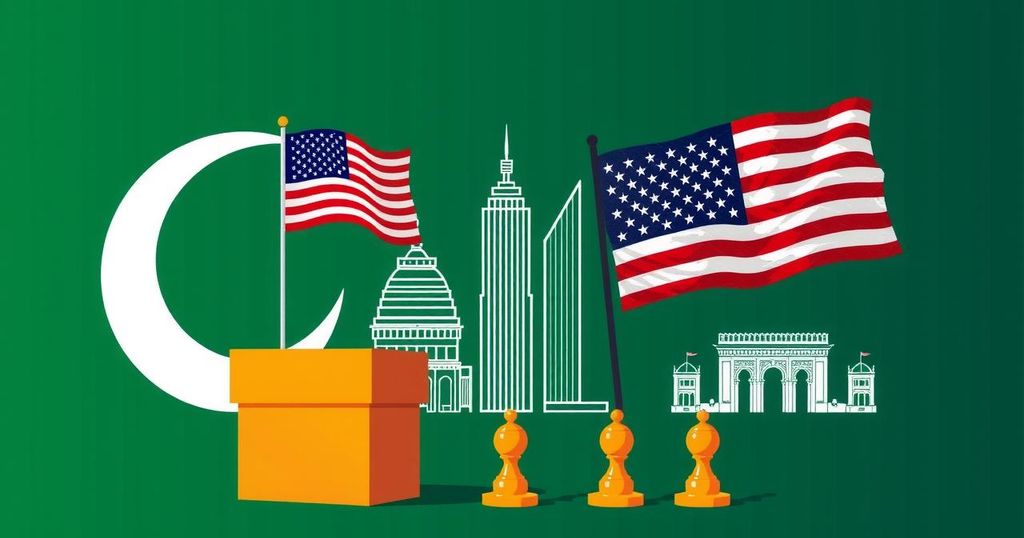Business
economics
AMERICA, ASIA, DONALD TRUMP, ECONOMY, EHSAN MALIK, EL SALVADOR, EXPORTS, FOREIGN INVESTMENT, GUATEMALA, HARRIS, IMF, INTERNATIONAL MONETARY FUND, KAMAL, MALIK, NICARAGUA, NORTH AMERICA, PAKISTAN BUSINESS COUNCIL, PHILIPPINES, SUPPLY CHAIN, TRADE, UNITED STATES, WORLD BANK
Jamal Walker
0 Comments
Implications of US Elections on Pakistan’s Economic Landscape
The upcoming US elections hold significant implications for Pakistan’s economy, particularly through trade and investment dynamics. Candidates Donald Trump and Kamala Harris present differing strategies that could impact Pakistani exports, especially in textiles. Trump’s potential tariffs may harm Pakistan’s economic interests, whereas Harris’s approach may facilitate better trading conditions. Both candidates prioritize boosting American purchasing power, which could indirectly benefit Pakistan’s export market. The election outcome will be pivotal in shaping future economic relations.
The potential impact of the upcoming US elections on Pakistan’s economy is a matter of significant interest, particularly given the contrasting economic strategies of presidential candidates Donald Trump and Kamala Harris. Both candidates emphasize strengthening middle-income groups and supporting businesses, which are crucial for Pakistan’s export-led economy. The United States is an essential market for Pakistani goods, constituting nearly 20% of the country’s total exports, making developments in US economic policy extremely impactful. US foreign direct investment (FDI) in Pakistan remains relatively low, contributing merely 4% to total FDI in FY24. Additionally, the economic dependency of Pakistan on multilateral institutions like the World Bank and International Monetary Fund (IMF), both of which are influenced significantly by US policies, further highlights the potential ramifications of the elections for Pakistan. Trump’s proposed ‘America First’ policies involve substantial tariffs on imports from China and possibly other countries, which could encompass Pakistan. This poses a threat to Pakistan’s textile and apparel exports, which are already vulnerable due to high domestic costs. In contrast, Harris has indicated a preference for dialogue with China, suggesting a lesser likelihood of imposing new tariffs on Pakistani imports. Both candidates have introduced measures aimed at increasing the purchasing power of American consumers. Harris has proposed expanding the child tax credit and providing tax relief to a significant portion of the American middle class. Trump similarly intends to raise the child tax credit, both initiatives potentially leading to increased demand for Pakistani textiles. Moreover, the candidates differ on corporate tax policies; Harris proposes an increase, while Trump aims to reduce corporate taxes for domestic manufacturers. This divergence may influence the limited US investment in Pakistan and affect future economic relations. Pakistan has historically missed opportunities presented by shifts in US trade policy, particularly during the US-China trade war. While other nations capitalized on these changes, Pakistan’s bureaucratic obstacles prevented it from doing so. However, if addressed adequately, Pakistan could position itself as an alternative destination for foreign investment.
The relationship between the United States and Pakistan is multifaceted, with significant implications for Pakistan’s economy, largely dependent on its exports to the US and foreign direct investment (FDI). As a crucial market for Pakistani goods, changes in US economic policies resulting from the presidential elections can either bolster or hinder Pakistan’s economic growth. The candidates’ differing approaches to tariffs, taxation, and international trade relations could greatly affect Pakistan’s export potential and the overall investment climate in the country. Trump’s election stance includes imposing tariffs which may disadvantage Pakistani exports, while Harris’s potential focus on diplomatic dialogue could create a more favorable trade environment. Furthermore, the economic levers that the US controls over international financial institutions further entwine Pakistan’s economic fate with US political developments.
In conclusion, the outcome of the US elections could significantly influence Pakistan’s economy, particularly through its impact on trade and investment. Trump’s policies may impose stricter tariffs detrimental to Pakistani exports, while Harris’s more diplomatic approach could soften any potential economic backlash. As both candidates seek to enhance American purchasing power, the resulting economic environment could provide either challenges or opportunities for Pakistan, contingent upon the direction of US policies following the election.
Original Source: www.dawn.com




Post Comment